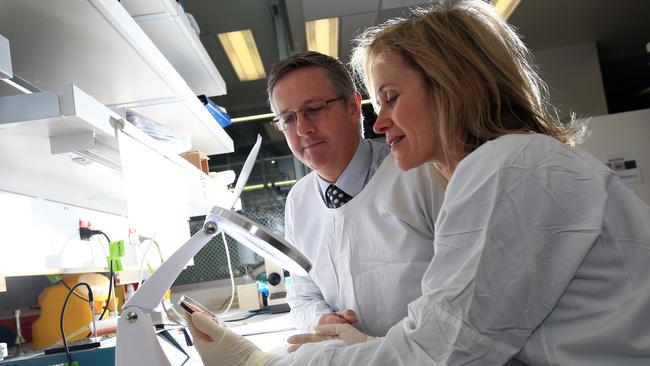Gene editing breakthrough stops coronavirus from replicating in cells
Australian researchers have discovered a way to stop the coronavirus from replicating in infected human cells using advancements in gene editing, in a major step towards a new treatment for Covid-19.

Australian researchers have discovered a way to stop the coronavirus from replicating in infected human cells using advancements in gene editing, in a major step towards a new treatment for Covid-19 as well as other viruses.
A team from the Doherty Institute and Peter MacCallum Cancer Centre was able to build on previous research on a type of gene-editing tool called a CRISPR – which detects and destroys DNA from similar organisms – that had been found to fight cancer in children and apply it to Covid-19.
The study found the tool was able to prevent the RNA virus, SARS-CoV-2, that causes Covid-19 using an enzyme, called a CRISPR-Cas13b, that binds to target RNAs and degrades the part of the virus’s genome that is needed to replicate inside the cell.
The groundbreaking technique has also been shown to be effective against the newer variants of concern in test tube models, offering hope as the more transmissible Delta variant continues to wreak havoc around the world.
Doherty Institute director Sharon Lewin said while vaccines were important to the global fight against Covid-19, the need remained urgent to discover a treatment for patients who were already infected and that could potentially be applied to other viruses when they emerged.
“The flexibility of CRISPR-Cas13b – which only needs the viral sequence – means we can look to rapidly design antivirals for Covid-19 and any new emerging viruses,” Professor Lewin said.
Mohamed Fareh, who was part of the original team along with Joe Trapani at the Peter MacCallum Cancer Centre that showed that a CRISPR gene editing tool could be used to eliminate abnormal RNAs in children’s cancers, said the discovery also had exciting applications for other diseases.
“Unlike conventional antiviral drugs, the power of this tool lies in its design flexibility and adaptability, which make it a suitable drug against a multitude of pathogenic viruses including influenza, Ebola, and possibly HIV,” Dr Fareh said.
The collaboration with the Doherty Institute came about when Dr Fareh’s team reached out to Professor Lewin, who believed they could tweak their cancer gene-editing tools to tackle Covid-19.
Dr Fareh said the inspiration for the gene-editing tool came about by observing the naturally occurring “arms race” in bacteria.
“We just watched the bacteria which are constantly infected with viruses … They unlock this arsenal of protein that allows them to have immunity against these viruses … so basically we just watched this bacteria and copied the design for Covid-19,” he said.
The team will move on to test the technology in animal studies, before moving on to clinical trials.
The results were published in science journal Nature Communications on Tuesday.




To join the conversation, please log in. Don't have an account? Register
Join the conversation, you are commenting as Logout